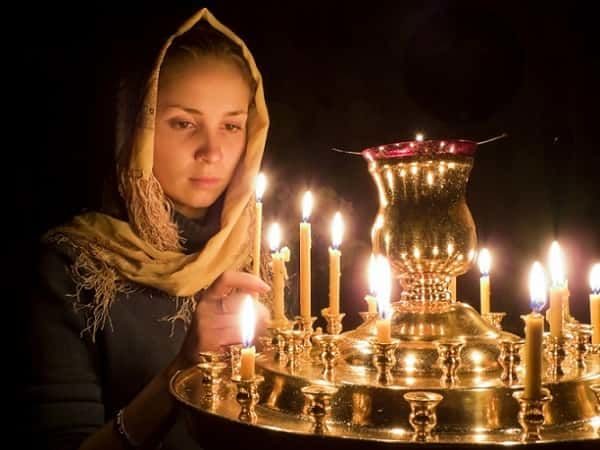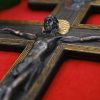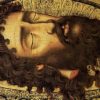The honesty of the Bible about the failings of so many of its main characters is astonishing. That is true of Abraham, Moses, David, and even our Lord’s disciples, who eventually became great leaders of the Church and living icons of His salvation. In the encounter recorded in today’s gospel reading, their spiritual vision was still clouded and unfocused. That is why they lacked the strength to heal the young man. The Savior responded to their spiritual impotence, “O faithless and perverse generation, how long am I to be with you? How long am I to bear with you? Bring him here to me.” After Christ healed him, He explained that the disciples’ weakness was “Because you have no faith. For truly, I say to you, if you have faith as a grain of mustard seed, you will say to this mountain, ‘Move from here to there,’ and it will move; and nothing will be impossible to you. This kind never comes out except by prayer and fasting.”
This incident occurs immediately after the Transfiguration, when the Lord opened the spiritual eyes of Peter, James, and John on Mt. Tabor so that they could behold His divine glory, to the extent that that is possible for human beings. Nonetheless, the disciples remained at this point spiritual weaklings who were powerless before the forces of evil and corruption. It was not until after the Savior’s resurrection that they understood Who He is and that His kingdom is not of this world. Until then, they had expected Him to be a political-military Messiah who would give them positions of power and privilege in an earthly realm in which their nation would be exalted and its enemies destroyed. Consequently, His crucifixion appeared to them as a tragic failure to grasp power and defeat the Romans. Peter denied Him three times after His arrest and only John the Theologian stood by the Lord as He died on the Cross. The rest had run away in fear.
The contrast between those closest to Christ during His earthly ministry and St. Paul’s description in our epistle lesson of the calling of true apostles is staggering. They had lacked faith to the point that they were powerless in the face of evil and were interested only in a Lord Who would give them worldly power. They were part of a “faithless and perverse generation” that had no interest in sharing in the life of a Messiah “Who humbled Himself by becoming obedient to the point of death, even death on a cross.” (Phil. 2:8) It was only after the Lord’s resurrection and the descent of the Holy Spirit that they gained the strength to manifest and proclaim His victory over the corrupting power of sin and death. Then they had the faith to entrust themselves fully to Christ such that His ministry continued through them as “The blind receive their sight, and the lame walk, the lepers are cleansed, and the deaf hear, the dead are raised up, and the poor have the gospel preached to them.” (Matt. 11: 5)
They also followed their Lord in living “like men sentenced to death” who appeared weak by every conventional standard. The apostles endured “hunger and thirst” and were treated as “the scum of the earth, the garbage of the world” as they endured abuse from all quarters as traitors and blasphemers. They responded to their tormentors as the Lord did, blessing those who slandered and persecuted them. Because St. Paul, like the other apostles, became a beautiful living icon of Christ, he could urge the Corinthians with integrity to “be imitators of me.” Only those who have conformed their character to the Lord’s may dare to tell others that following their own example is the way to follow Him.
Regardless of our particular vocations in the Church or our life circumstances, we all share the common calling to unite ourselves to the God-Man in holiness and become “partakers of the divine nature.” We are to display personally His fulfillment of the human person in the divine likeness. We are to live in a way that brings light to a darkened world and inspires others to glorify God. Our righteousness is to be of a different kind than the legalistic hypocrisy of the scribes and Pharisees as we “become perfect as our Father in heaven is perfect.” There are many different callings in the Church and in our life in the world, but Christ calls us all to acquire the same spiritual character that He embodies. It is the character He described in the Sermon on the Mount, including humility, mercy, forgiveness, longing for righteousness, and purity of heart. St. Paul’s description of the ministry of true apostles is simply an application of this basic vision of the Christian life to that particular calling.
We must never think that the vocation to holiness is reserved exclusively for some people, perhaps the clergy, the monastics, or only the great saints. We must never think that holiness is only a possibility for people who have not fallen into particular sins or who do not struggle with certain temptations. Because Christ is truly the God-Man, no dimension of our nature is excluded from His healing. Because of His incarnation, no human being is shut off from the calling to become like Him. The only question is whether we will remain as weak and confused as the disciples were when they could not heal the young man due to their lack of faith or gain the strength and clarity that they later acquired as they became brilliant living icons of Christ.
As we continue to fast before the Dormition of the Theotokos, we remember that she is the ultimate model of faithfulness to her Son. Unlike the disciples who lacked faith, prayer, and fasting, she attended to the one thing needful as she heard the word of God and kept it. She gained the spiritual strength to say “yes” to the Lord with her entire life and to defeat every temptation. She was the first to receive Christ and, upon her death, became the first to enter into the joy of the heavenly kingdom as a whole, embodied person. The Theotokos shines brightly as a sign of hope that we all may entrust ourselves so fully to Christ that we too may enter into eternal life, both in the world as we know it and in the age to come.
She did not gain the spiritual strength to agree to become the living temple of the Savior by accident, but devoted herself to prayer and purity for years as she grew up in the Temple in Jerusalem. She maintained the same spiritual focus after her betrothal to her guardian Joseph. In the two weeks of the Dormition Fast, we follow her example in small ways through intensified prayer and fasting. Now that the fast is almost over and we will soon celebrate the feast, we must retain our spiritual focus in becoming imitators of the Theotokos in her deep faith. She did not reduce her faith to feelings or words and certainly never gained any power or prominence by worldly standards during her lifetime. Let us follow her example of entrusting herself to Christ, of mindfully offering her life to Him as she rejected every temptation to the contrary. That kind of faith is not a one-time event, but an ongoing offering of oneself to the Lord no matter how well we think our lives our going, no matter what fears we have, and no matter what anyone else thinks of us.
It is also how we can find liberation from being spiritual weaklings who feel powerless before temptation and impotent before the challenges of living faithfully in a world enslaved to the fear of death. Regardless of our particular calling in life, we can all become holy temples of the Lord by embracing His healing from the depths of our hearts. That will not happen by accident, but as we cultivate the faith that can move mountains through prayer, fasting, and all the other spiritual disciplines through which we may become imitators of the Theotokos and the apostles in offering ourselves to Christ. There was hope for the disciples and there is hope for us, if we will only entrust ourselves fully to the Lord. At the end of the day, that is what having faith in Him is all about.

















